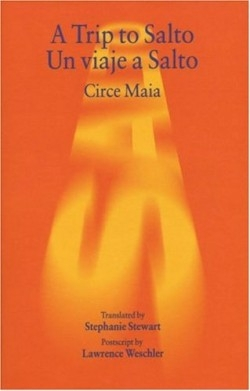Un Viaje a Salto (A Trip To Salto)
In 1972, in Montivideo, Uruguay, a young mother and her physician husband are roughly awakened by soldiers at three in the morning. The father is dragged away, and the mother is left to attend to her child. The baby will grow through her first decade with only occasional glimpses of her father. The young mother was this poet, who is also a journalist. Through a series of letters, memoirs, and a diary addressed to her missing husband, she introduces the reader to a harrowing decade of terror, anguish, and brutality only recoverable in its true intensity by a first-person report.
After a brief introduction, which poses as an anonymous manuscript, the book opens with “A Trip with Papa on the Train to Salto,” written from the point of view of Maias daughter. The simple immediacy of this document all but teleports the reader onto the train, where they find their beloved prisoner surrounded by soldiers and forbidden to speak or even to look at his wife. “Mama brought me,” says the child, “because if they didnt let her talk with him for a while, maybe they would let me talk with him because I was his daughter and I was little.”
The body of the report is written in the more mature voice of the mother and introduced with a note to her daughter that maybe “its better if I pretend Im talking to Papa himself.” The book continues with the mothers recap of the trip to the Salto prison, and ends with “Notes from a Diary,” depicting ten years of anguish, anxiety, and despair before life proceeds again with whatever they can recover of normality. In her answer to her daughters question of what she should say to playmates who ask why her father is in prison, it emerges that her doctor husbands “crime” is that he sent medicine to wounded members of the opposition.
By 1986, the book was complete and Maias husband had finally been released from an imprisonment based on absurd and dishonest charges. Fearing that the unstable government might yet revert to the former terrorism controlled by the military, Maia denied authorship of her book.
It was only in 1992 that the book was finally issued in Uruguay, with a new introduction acknowledging Maia as the author, and a brilliant translation (Stewart spent a year in Uruguay on a Fullbright grant working with Maia). The freshness and the intensity of emotion in every paragraph are evident, and the book speaks with a personal eloquence through the passion of the mother, the innocent faith of the daughter, and the courage of their husband and father.
Reviewed by
Sandy McKinney
Disclosure: This article is not an endorsement, but a review. The publisher of this book provided free copies of the book to have their book reviewed by a professional reviewer. No fee was paid by the publisher for this review. Foreword Reviews only recommends books that we love. Foreword Magazine, Inc. is disclosing this in accordance with the Federal Trade Commission’s 16 CFR, Part 255.

